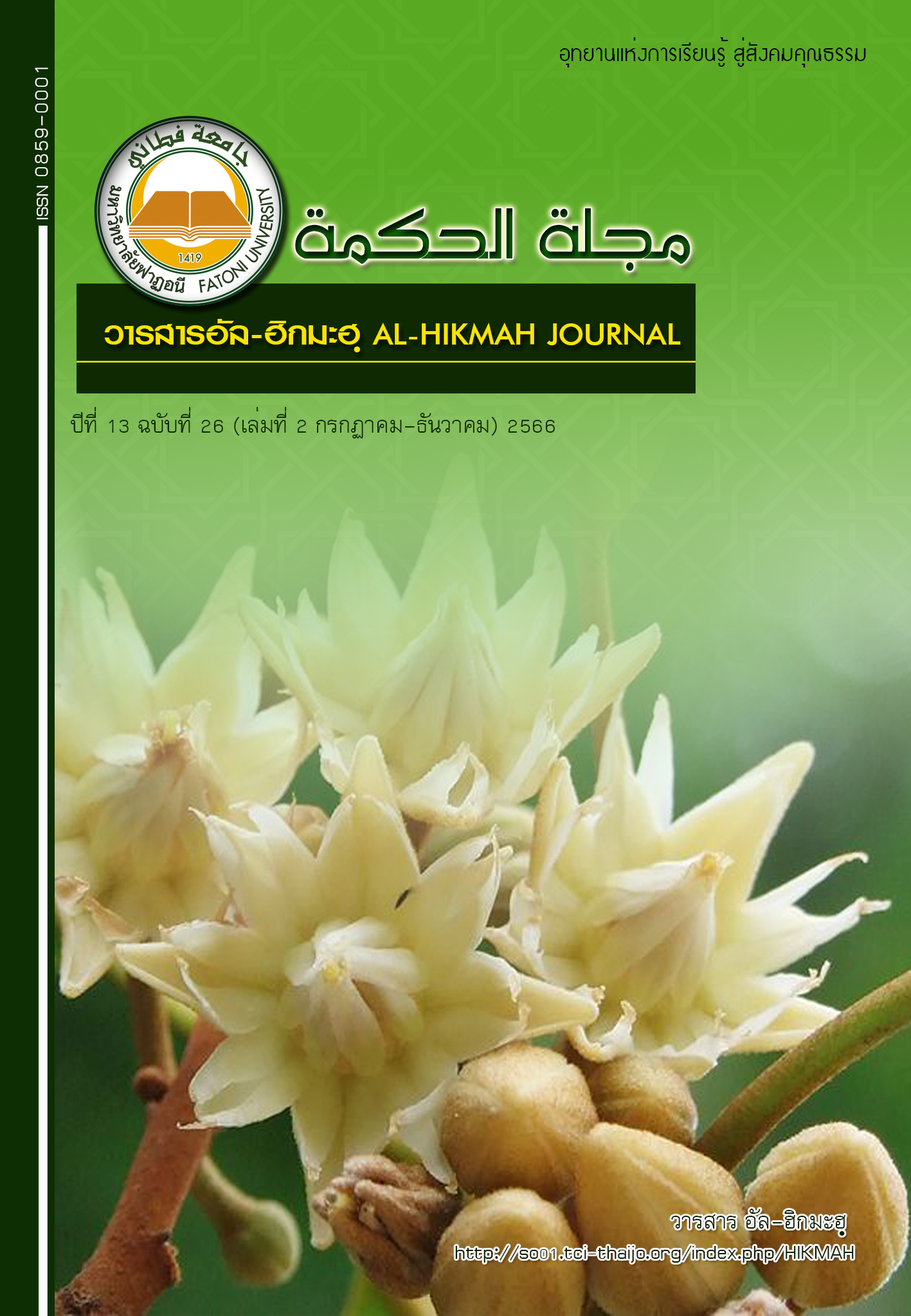The Development of a Collaborative Network for Developing Out of School Learning Resources among Islamic Private Schools in Saiburi District, Pattani Province
Keywords:
Collaborative Network, Out of School Learning Resources, Islamic Private school, Saiburi DistrictAbstract
The objectives of this research and development research are 1) to develop a training package for teachers to create a collaborative network to develop out-ofschool learning resources for Islamic private schools in Saiburi District, Pattani Province, and 2) to examine the results of using this proposed training package. The samples were 8 secondary school teachers in 4 private Islamic schools under Salindong Bayu school group, Saiburi District, Pattani Province. The research instruments comprised a training package consisting of training plans and the training satisfaction questionnaire. The results show that (1) the training package was developed under the concept of shura and jamaah which consisted of a 6-step process: awareness of the need for network building, coordination step of organization/network organization, covenantmaking, network management, relationship development, and maintain the relationship, and (2) teachers were able to develop a Saiburi city walk guide book for the students which comprised of 4 activities namely: visit the palace (istana raja), taste the food (cuba makan), build relationships (kawan kita), create a multicultural society (saleng budaya). Furthermore, teachers were satisfied with participating in the activities at a high level.
References
กิตติพงศ์ เซ่งลอยเลื่อนปรียา แก้วพิมลรัตติกาล เรืองฤทธิ์และ สุธินันท์ กําาเนิดรักษา. (2565). การสร้างสรรค์สื่อประชาสัมพันธ์ชุมชนบ้านเตราะบอน อําเภอสายบุรี จังหวัดปัตตานี. Journal of Information and Learning, 33(1), 91-100.
จิรภัทร มหาวงค์ วิทยา จันทร์ศิลา และทรงลักษณ์ เอื ้อนครินทร์. (2559). การพัฒนารูปแบบการบริหารเครือข่ายความร่วมมือทางวิชาการของโรงเรียนในถิ ่นทุรกันดารบนเขตพื ้นที ่สูง. วารสารศึกษาศาสตร์ มหาวิทยาลัยนเรศวร, 18 (4),114-127.
ชูศักดิ ์ เอกเพชร. (2561). การวิจัยปฏิบัติการ. สืบค้นจาก https://graduate.sru.ac.th/wpcontent/uploads/2018/11/Action-Research-1.pdf
ปริญญา จันทะคาม และ ธัชชัย จิตรนันท์. (2563). แนวทางการพัฒนาแหล่งเรียนรู ้โดยการมีส่วน ร่วมของชุมชนสำหรับสถานศึกษาสังกัดสำนักงานเขตพื ้นที ่การศึกษาประถมศึกษา มหาสารคาม เขต 1. วารสารมหาวิทยาลัยราชภัฏร้อยเอ็ด, 14(1), 91-108.
ปิยะ ศักดิ ์เจริญ. (2558). ทฤษฎีการเรียนรู ้ผู ้ใหญ่และแนวคิดการเรียนรู ้ด้วยการชี ้นำตนเอง : กระบวนการเรียนรู ้เพื่อการรส่งเสริมการเรียนรู ้ตลอดชีวิต. วารสารพยาบาลทหารบก ,16(1), 8-13.
พลเดช ปิ่นประทีป. (2556). การสร้างและบริหารเครือข่ายในยุคปัจจุบัน. สืบค้นจาก https://www.ldi.or.th/2016/08/30
พิณสุดา สิริธรังศร. (ม.ป.ป.). สุขภาวะของสามจังหวัดชายแดนภาคใต้ : ปัญหาที ่แก้ได้ด้วยการจัดการการเรียนรู ้แบบเครือข่ายการมีส่วนร่วม. สืบค้นจาก https://www.dpu.ac.th/ces/upload/km/1506842375.%20%E0%B8%9E%E0%B8%B4%E0%B8%93%E 0%B8%AA%E0%B8%B8%E0%B8%94%E0%B8%B2%2029-9-60
พิสิฐ เทพไกรวัล. (2554). การพัฒนารูปแบบเครือข่ายความร่วมมือเพื ่อคุณภาพการจัด การศึกษา ในโรงเรียนประถมศึกษาขนาดเล็ก. วิทยานิพนธ์ปริญญาปรัชญาดุษฎีบัณฑิต มหาวิทยาลัยขอนแก่น.
ยุทธนา เกื ้อกูล และ นิเลาะ แวอุเซ็ง. (2560). การพัฒนารูปแบบการบริหารงานวิชาการของ โรงเรียนเอกชนสอนศาสนาอิสลาม จังหวัดชายแดนภาคใต้เพื ่อสร้างผู ้เรียนสู ่ความเป็นมนุษย์ที่สมบูรณ์. วารสารอัล-ฮิกมะฮฺ มหาวิทยาลัยฟาฏอนี, 8(15), 15-28.
รจนา บุญลพ และกาญจนา ภัทราวิวัฒน์. (2563). บทบาทของค่านิยมร่วมและวิสัยทัศน์ร่วมใน ชุมชนการเรียนรู ้ทางวิชาชีพสู ่การพัฒนาการเรียนรู ้ของผู ้เรียน. วารสารการวัดผลการศึกษา มหาวิทยาลัยมหาสารคาม, 26(1), 110-112.
สถาบันเกอเธ่ ประเทศไทย. (2565). กิจกรรมเดินเมือง. สืบค้นจาก https://www.goethe.de /prj/tus/th/act/-.html
อับดุลสุโก ดินอะ. (2556). กระบวนการชูรอกุญแจสู่ความเป็นพลเมือง. สืบค้นจาก https://prachatai.com/journal/2013/04/46402
อาอิด๊ะ เจ๊ะแว. (2558). ปัญหาและแนวทางการพัฒนาการบริหารงานวิชาการ โรงเรียนเอกชนสอนศาสนาอิสลาม สังกัดสำนักงานการศึกษาเอกชนจังหวัดปัตตานี. (วิทยานิพนธ์ปริญญามหาบัณฑิต). ปัตตานี : มหาวิทยาลัยสงขลานครินทร์.
Abas, Z. & Ghofur, A. (2021). maintaining religious harmony through collaboration strategies. Indonesian Journal of Islamic Literature and Muslim Society, 6(2), DOI : 10.22515/islimus.v6i2.5209
Camarinha-Matos, L.M. & Afsarmanesh, H. (2006). Collaborative networks: Value creation in a knowledge society. In Proceedings of PROLAMAT’06 (Springer) – Shanghai, China, 14-16 June 2006. DOI:10.1007/978-0-387-79426-6
Clark, M.A., Robertson, M.M., & Young, S. (2018). “I feel your pain”: A critical review of organizational research on empathy. Journal of Organizational Behavior,40(2), 166-192.
Irajpour, A., Ghaljaei, F., & Alavi, M. (2014). Concept of collaboration from the Islamic perspective: the view points for health providers. Journal of Religion and Health, 54(5):1800-9. DOI: 10.1007/s10943-014-9942-z.
Katz, S.J., Earl, L., Jaafar, S.B., & Elgie, S. (2008). Learning networks of schools: The key enablers of successful knowledge communities. McGill Journal of Education, 43(2):111. DOI:10.7202/019578ar
Phiraisaengchan, P., Puthaprasert, C. ., Yaboonthong, Y. ., & Manokarn, M. . (2021). Developing a model of collaborative network for promoting learning management efficiency in schools under Chiang Mai Primary Educational Service Area. Interdisciplinary Research Review, 16(1), 12–17.
Wijaya, A. & Ramadhon, R. (2022). Collaborative relations between Islamic religious education (PAI) teachers and parents in Islamic education. Journal of Research in Islamic Education, 4(2),106-122. DOI: 10.25217/jrie.v4i2.2945
Downloads
Published
How to Cite
Issue
Section
License
Copyright (c) 2023 Al-HIKMAH Journal

This work is licensed under a Creative Commons Attribution-NonCommercial-NoDerivatives 4.0 International License.



